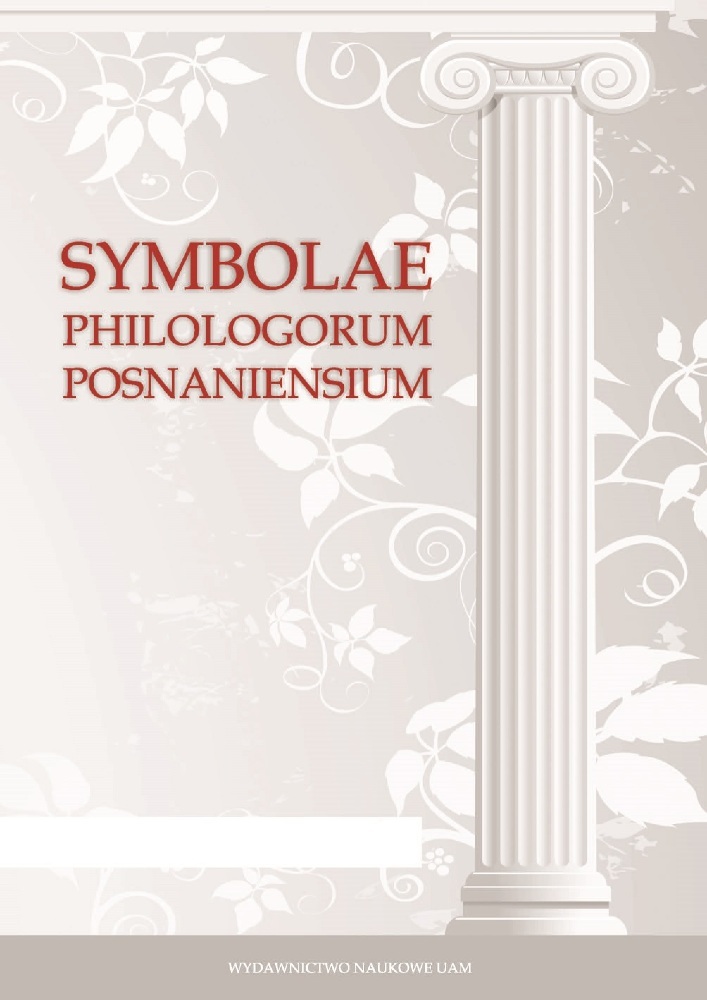Abstract
In this article I would like to focus on one research topic: how ancient tragedians manipulated their drama plots (based on Greek mythology) so as to use them for influencing Athenian “international policies.” Those were not any mistakes or airs of nonchalance on the part of the Athenian tragedians; it was just their carefully premeditated strategy of creating persuasive messages to function as pure propaganda. I am chiefly directing my attention to the topic of how the Athenians established their relations with the allies. Meaning the closest neighbours as well as some of those who did not belong in the circle of the Hellenic civilization. I have decided to devote all of my attention to Aeschylus’ and Euripides’ works, as both of them were obvious supporters of the democratic faction. I focused my attention on the texts: Aeschylus: The Suppliants, Oresteia; Euripides: Heracleidae, Andromache, Archelaus,Temenos.
Literaturhinweise
Primary sources
Aeschylus. Suppliant Women. Trans. by H. W. Smyth. 1926. Cambridge.
Euripides. Heracleidae. Trans. by D. Kovacs. 1994. Cambridge.
Euripides. Children of Heracles. Hippolytus. Andromache. Hecuba. Trans. by D. Kovacs. 1995. Cambridge.
Euripides. Tragedies. Trans. by J. Łanowski. 2005. Warsaw.
Euripides. Tragedies. Trans. by J. Łanowski. 2006. Warsaw.
Herodotus. Histories. Trans. by A. D. Godley. 1920. Cambridge.
Homer. The Iliad. Trans. by A. T. Murray. 1924. Cambridge.
Jelinek E. Podopieczni . Trans. by K. Bikont. In Dialog 4 (2015): 75–121.
Plato. Plato in Twelve Volumes. Trans. by R. G. Bury. 1967–1968. London.
Secondary sources
Chou 2012: Chou, M. 2012. Greek Tragedy and Contemporary Democracy. London.
Hall 2007: Hall, J. 2007. “Politics and Greek Myth.” In The Cambridge Companion to Greek Mythology. Ed. By R. D. Woodard, 331–354. Cambridge.
Harder 1985: Harder, A. 1985. Euripides’ Cresphontes and Archelaus. Leiden.
Macleod 2007: Macleod, C. 2007. “Politics and the Oresteia.” In Oxford Readings in Classical Studies: Aeschylus. Ed. by M. Lloyd, 265–301. Oxford.
Lesky 2006: Lesky, A. 2006. Tragedia grecka. Przeł. M. Weiner. Kraków.
Pickard-Cambridge 1988: Pickard-Cambridge, A. W. 1988. The Dramatic Festivals of Athens. Oxford.
Sommerstein 1997: Sommerstein, A. 1997. “The theatre audience, the Demos, and the Suppliants of Aeschylus.” In Greek tragedy and the historian. Ed. by C. Pelling, 63–79. Oxford.
Sourvinou-Inwood 2003: Sourvinou-Inwood, C. 2003. Tragedy and Athenian Religion. Oxford.
Rhodes 2003: Rhodes, P. J. 2003. “Nothing to Do with Democracy: Athenian Drama and the Polis.” Journal of Hellenic Studies 123: 104–119.
Rosen 2010: Rosen, R. 2010. “Aristophanes.” In Brill’s Companion to the Study of Greek Comedy. Ed. by G. W. Dobrov, 227–278. Leiden–Boston.
Śmiechowicz 2018: Śmiechowicz, O. 2018. Didaskalia do historii – teatr starożytnej Grecji i jego kontekst polityczny – czyli historia teatru dla zaawansowanych. Kraków: Universitas.
Wilamowitz-Moellendorff von 1899: Wilamowitz-Moellendorff von, U. 1899. “Excurse zum Oedipus des Sophokles.” Hermes 34: 55–80.
Wilson 2000: Wilson, P. 2000. The Athenian Institution of the Khoregia: The Chorus, The City and the Stage. Cambridge.
Zuntz 1955: Zuntz, G. 1955. The political plays of Euripides. Manchester.
Lizenz

